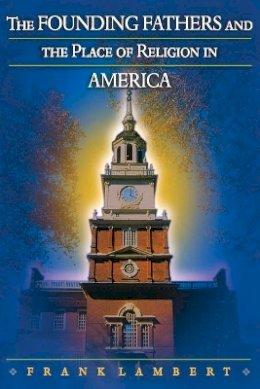
Stock image for illustration purposes only - book cover, edition or condition may vary.
The Founding Fathers and the Place of Religion in America
Frank Lambert
€ 46.41
FREE Delivery in Ireland
Description for The Founding Fathers and the Place of Religion in America
Paperback. How did the United States, founded as colonies with explicitly religious aspirations, come to be the first modern state whose commitment to the separation of church and state was reflected in its constitution? This title explains why this happened, offering in the process a synthesis of American history. Num Pages: 344 pages. BIC Classification: 1KBB; HBJK; HBLH; HRA. Category: (P) Professional & Vocational; (U) Tertiary Education (US: College). Dimension: 232 x 155 x 21. Weight in Grams: 482.
How did the United States, founded as colonies with explicitly religious aspirations, come to be the first modern state whose commitment to the separation of church and state was reflected in its constitution? Frank Lambert explains why this happened, offering in the process a synthesis of American history from the first British arrivals through Thomas Jefferson's controversial presidency. Lambert recognizes that two sets of spiritual fathers defined the place of religion in early America: what Lambert calls the Planting Fathers, who brought Old World ideas and dreams of building a "City upon a Hill," and the Founding Fathers, who determined the constitutional arrangement of religion in the new republic. While the former proselytized the "one true faith," the latter emphasized religious freedom over religious purity. Lambert locates this shift in the mid-eighteenth century. In the wake of evangelical revival, immigration by new dissenters, and population expansion, there emerged a marketplace of religion characterized by sectarian competition, pluralism, and widened choice. During the American Revolution, dissenters found sympathetic lawmakers who favored separating church and state, and the free marketplace of religion gained legal status as the Founders began the daunting task of uniting thirteen disparate colonies. To avoid discord in an increasingly pluralistic and contentious society, the Founders left the religious arena free of government intervention save for the guarantee of free exercise for all. Religious people and groups were also free to seek political influence, ensuring that religion's place in America would always be a contested one, but never a state-regulated one. An engaging and highly readable account of early American history, this book shows how religious freedom came to be recognized not merely as toleration of dissent but as a natural right to be enjoyed by all Americans.
Product Details
Format
Paperback
Publication date
2006
Publisher
Princeton University Press United States
Number of pages
344
Condition
New
Number of Pages
344
Place of Publication
New Jersey, United States
ISBN
9780691126029
SKU
V9780691126029
Shipping Time
Usually ships in 15 to 20 working days
Ref
99-2
About Frank Lambert
Frank Lambert is Professor of History at Purdue University. He is the author of "Pedlar in Divinity" and "Inventing the "Great Awakening" (both Princeton).
Reviews for The Founding Fathers and the Place of Religion in America
One of Choice's Outstanding Academic Titles for 2003 "A responsible, clearly written analysis of the currently disputed mindset of the Founding Fathers regarding the role of religion in American society. Numerous quotations from the personal and professional writings of the Founding Fathers themselves bring a refreshing vitality to Lambert's work while simultaneously dispelling the absolutized assumptions of contemporary conservatives and liberals alike."
Religion and Liberty "Lambert has made a major contribution to US religious, constitutional, and political history with this superb book."
Choice "Lambert's book epitomizes the virtues of narrative history, not least in the clear and straightforward prose style that propels the narrative from Jamestown through the elections of 1800... [Lambert] is especially skillful at simultaneously sketching a large portrait of historical change over time and filling in that picture with evocative vignettes and first-person accounts."
Andrew R. Murphy, Christian Century This is an excellent book that captures the progression from religious conformity to religious freedom in early America... [It] provides a fine, scholarly overview of the emergency of religious freedom in the fledgling nation."
Derek H. Davis, Journal of Religion
Religion and Liberty "Lambert has made a major contribution to US religious, constitutional, and political history with this superb book."
Choice "Lambert's book epitomizes the virtues of narrative history, not least in the clear and straightforward prose style that propels the narrative from Jamestown through the elections of 1800... [Lambert] is especially skillful at simultaneously sketching a large portrait of historical change over time and filling in that picture with evocative vignettes and first-person accounts."
Andrew R. Murphy, Christian Century This is an excellent book that captures the progression from religious conformity to religious freedom in early America... [It] provides a fine, scholarly overview of the emergency of religious freedom in the fledgling nation."
Derek H. Davis, Journal of Religion
